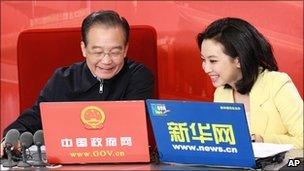China lowers growth rate target in sustainability drive
- Published

Mr Wen was taking part in an online Q&A with internet users in what has become an annual event
China's Prime Minister Wen Jiabao says China is lowering its annual economic growth target from 7.5% to 7% and is determined to contain soaring prices.
He was speaking in a question and answer session with internet users in what has become an annual online chat.
Mr Wen said China needed to ensure that growth was sustainable.
Inflation is officially running at almost 5% but food prices have surged by 10%, creating public discontent.
The lowering of the growth rate is mainly symbolic - as economic growth has exceeded the 7.5% target every year in the last six years.
Last year, growth reached 10.3%, making China the world's fastest-expanding major economy.
But along with the breakneck growth have come price rises, particularly for food and housing, which the prime minister acknowledged were affecting people's livelihoods and even social stability.
'Quality' growth
Mr Wen said the growth rate change would "raise the quality and efficiency of economic growth" and conceded that one factor was the impact on the environment.
"We absolutely must not any longer sacrifice the environment for the sake of rapid growth and reckless roll-outs," said Mr Wen. "That will lead to production capacity gluts and deepening pressure on the environment and resources so that economic development will be unsustainable."
He said the purpose of economic development was "to meet the people's growing material and cultural needs, and make the lives of commoners better and better."
Maintaining social stability was also central to the country's foreign exchange policy, said Mr Wen, requiring a step-by-step increase in yuan flexibility so that Chinese businesses could adapt to the changes.
The premier also said Beijing was determined to stamp out corruption - citing the dismissal last week of Liu Zhijun, the former railways minister, who is being investigated by the Communist Party's corruption watchdog.
Mr Wen's online session comes ahead of the annual parliament session from 5 March.
Correspondents say his comments reflect the anxiety of China's leadership about discontent over price rises.
A recent online appeal urged people to come out for low-level "strolling" protests every Sunday afternoon.
The authorities responded by deploying hundreds of police city centre sites in Beijing and Shanghai.
In Shanghai they used street-cleaning vehicles to keep passers-by moving and tried to prevent journalists taking photographs.
In Beijing, the intended protest spot was fenced off. A BBC crew was briefly detained when they tried to film police clearing the area.
- Published8 February 2011
- Published17 February 2011